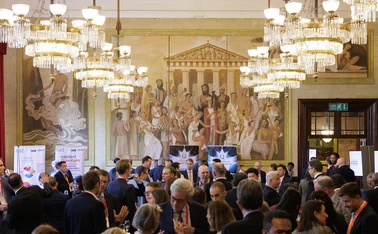
Financial market infrastructure services: LSEG
The company stood out for helping Mauritania to digitalise its financial architecture

When the Central Bank of Mauritania embarked on a financial infrastructure modernisation programme, with support from a $532,980 loan by the African Development Bank, it turned to the London Stock Exchange Group (LSEG) for help.
The north African central bank decided to use the group’s services because of the LSEG’s track record when it comes to the transformation of the financial landscape in frontier economies. This includes upgrading primary and secondary market trading workflow and infrastructure, notably for foreign exchange.
Nuno Neto, the global head of central banks in LSEG’s data and analytics business, tells Central Banking the company has collaborated with several multilateral development institutions that provide funding and technical support to frontier and emerging markets, with Mauritania being a notable example.
For its part, the Central Bank of Mauritania looked to developments in both Tunisia and Morrocco as offering regional roadmaps for developing its markets. Mohamed El Moktar Malick, head of the FX market department at the Central Bank of Mauritania, tells Central Banking that the staff conducted fact-finding missions to Morocco and conference calls with Tunisia.
Neto describes Mauritania’s digital financial market ecosystem as “nascent” prior to the financial infrastructure modernisation programme. “We played a pivotal role in assisting the Central Bank of Mauritania and local banks by implementing technology that streamlined processes, reduced operational risks and enhanced efficiency,” he says.
Mauritania’s financial markets were previously constrained by manual processes, particularly in open market operations and interbank activities. Neto says the LSEG’s partnership with the central bank and the sell-side community also led to the development and implementation of solutions tailored to local market needs.
“We really changed everything in Mauritania,” Mohamed Cheikh Seyid, deputy director of FX monitoring and analysis at the Central Bank of Mauritania, tells Central Banking. “Before this project we had an exchange market, with the central bank being the sole participant who would always sell currencies to the other banks. There was no interbank exchange. There was no direct contact between them. There was no trading. They didn’t do trading.”
The digitisation of the paper-based processes required careful coordination with all parties involved. Commercial banks needed to be proficient in using the new systems, and the central bank required sufficient knowledge to use the system oversight tools.
Ensuring a sufficient level of education, Neto says, was one of the project’s greatest hurdles. This involved extensive efforts in upscaling both the central bank and the sell-side community, including more than 20 sessions with banks and market participants and about six with the central bank.
Neto says the new services implemented by LSEG included auctions, an interbank trading platform, enhanced price discovery, new reporting capabilities and market oversight for the central bank. “These enhancements facilitate the central banks in raising capital domestically and managing liquidity through open market operations more effectively,” Neto adds.
Neto says all 16 banks have now moved from manual to electronic operations. “They have shifted from conducting operations over the phone and via email to a connected, transparent electronic ecosystem,” he says. “This system allows for electronic bid submissions for liquidity requirements, with the central bank allocating resources in a more transparent, efficient and timely manner.”
Malick says the project went live on December 14, 2023, and the African Development Bank is paying for the first year of LSEG licences for both the central bank and the 16 commercial banks involved.
“It’s also important to mention that during this period we worked with the IMF,” says Seyid. “A team from the IMF was here to help us in workshops and when we were writing the regulatory text. So, they know everything about the project. They are here to help us. We do a lot of calls with them.”
Neto describes the development and implementation of a fully integrated 360-degree ecosystem over six months, which included rigorous testing. He says interbank activities under the supervision of the central bank have been significantly bolstered since the system went live last year.
The Central Bank of Mauritania says daily exchange volumes between banks are around $10 million–11 million and €3 million–4 million. “We do just spots. But we have plans to do forwards or futures,” Seyid says.
“We will try to innovate and make it bigger – a bigger market – and add other products like swaps,” Melick adds.
Mohamed-Lemine Dhehby, governor of the Central Bank of Mauritania, emphasised the programme’s significance, stating: “Our partnership with LSEG marks a significant step in the ongoing enhancement of Mauritania’s financial market.”
Neto adds LSEG remains committed to the ongoing development of Mauritania’s domestic markets: “Our focus is on adding new instruments and asset classes to enhance market capabilities and support internationalisation, aiming to attract more foreign investment.”
The Central Banking Awards 2024 were written by Christopher Jeffery, Daniel Hinge, Dan Hardie, Joasia Popowicz, Ben Margulies, Riley Steward, Jimmy Choi and Blake Evans-Pritchard.
Only users who have a paid subscription or are part of a corporate subscription are able to print or copy content.
To access these options, along with all other subscription benefits, please contact info@centralbanking.com or view our subscription options here: www.centralbanking.com/subscriptions
You are currently unable to print this content. Please contact info@centralbanking.com to find out more.
You are currently unable to copy this content. Please contact info@centralbanking.com to find out more.
Copyright Infopro Digital Limited. All rights reserved.
As outlined in our terms and conditions, https://www.infopro-digital.com/terms-and-conditions/subscriptions/ (point 2.4), printing is limited to a single copy.
If you would like to purchase additional rights please email info@centralbanking.com
Copyright Infopro Digital Limited. All rights reserved.
You may share this content using our article tools. As outlined in our terms and conditions, https://www.infopro-digital.com/terms-and-conditions/subscriptions/ (clause 2.4), an Authorised User may only make one copy of the materials for their own personal use. You must also comply with the restrictions in clause 2.5.
If you would like to purchase additional rights please email info@centralbanking.com




